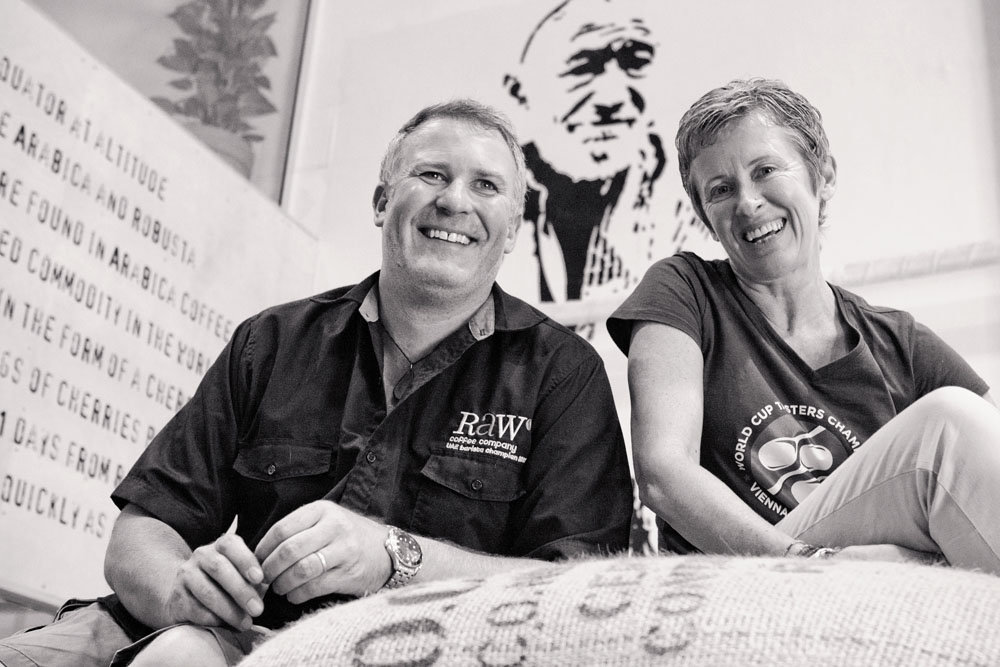
Sit in raw Coffee Company’s popular Dubai warehouse café, listening to the hum of a busy espresso machine and with sacks of beans stretching towards the 10-metre-high ceiling, it’s hard to believe the Kiwi-owned boutique roastery very nearly went bankrupt before it made its first cup of coffee.
A series of problems since the launch in 2007, including an internal family dispute at the German manufacturer, left Raw with no roasting machine for eight months and buckling under crippling overheads. By the time Raw got its roaster, the money had run out, says founder and managing director Kim Thompson. She was forced to sell in late 2008, and start again in a converted 40-foot container.

“When people tell you that you need three years’ cash flow, listen to what they say,” says Thompson, who sold her home as Raw fought to survive. She also had to borrow money fromfamily – Dubai’s banks reject 75% of all SME loan applications.
It was only two years ago, says Thompson, who co-owns the business with fellow Kiwi (and former Telecom executive) Matt Toogood, that it looked like Raw was going to make it. “We were tenacious. We were on a rollercoaster that we couldn’t get off.”
For all Dubai’s glitz and glamour, even in the early 2000s there was no decent locally roasted coffee, says Thompson, a registered nurse from Nelson who managed a café in the United Arab Emirates before founding Raw. “We were bootleggers, bringing in bags of coffee from our favourite New Zealand roasters back to Dubai inside our suitcases. “We were thinking there was a gap in the market for roasting organic, fair trade coffee,” says Thompson.


In 2007, their first import was 10 sacks (690kg) of Arabica beans. This year, Raw will grind and supply cafes, restaurants and retail outlets across the United Arab Emirates with four container loads (75,000kgs) of ethically sourced beans from Ethiopia, Congo, Colombia and Yemen. The past three years have seen the company post consecutive year-on-year growth of 45% and – ironically – fend off finance nd partnership offers from banks and wealthy Arabs from Kuwait, Qatar and Saudi Arabia. There is an exit plan, says Thompson. “But I don’t want to leave any time soon because it’s fun now.”
“Fun” means an ambitious wave of new initiatives over the next 12 months. Although Thompson confesses delegation doesn’t come easy to her, a month ago Raw hired an operations manager from New Zealand. He’s going to be busy, she says. Staff numbers, currently 19, are set to double, and Raw is about to close the deal on a new 7000 square foot warehouse which will double their storage capacity. A second Raw café is due to open at one of Dubai’s premium retail precincts and the company is going to market with a “super premium” brand called Mokha 1450, in a corporate social responsibility partnership with an American equity firm who want to focus on poverty in Yemen, where the prized Mokha bean is sourced.


Perhaps most surprisingly of all, Raw is launching a breakaway retail brand that will operate from barista kiosks in the lobbies of Dubai’s most prestigious commercial towers. Thompson says this new brand – whose name is currently being trademarked – promises to be edgy and will jolt conservative, corporate Dubai. Another differentiator is the coffee. Baristas will serve ‘Third Wave Coffee’ – a movement whereonly the best-trained baristas work with special origin beans and techniques to create an artisan product and experience, like winemakers. Guerilla marketing and aggressive sales targets (1000 cups/day/kiosk) are cornerstones of the business plan. “This is an opportunity to build a new brand and franchise it,” says Thompson. “Raw will not be franchised. We don’t want Raw to lose its soul.”
Thompson loves coffee, like really loves coffee. She ponders the merits of different espresso machines and grinders, like Jeremy Clarkson might a Ferrari and Porsche. That obsession over product and process saw them signed up by Verre, celebrity chef Gordon Ramsay’s first restaurant outside the UK, and Raw’s first commercial client. “It was a huge breakthrough.” Others followed. “People come to us because we have a reputation for very good coffee,” says Thompson. “And we care.”


Every year Raw sends employees to Europe to learn the latest techniques and trends, and they invest heavily in training the baristas at venues they supply. Potential clients must submit business plans to prove they are committed to a programme of staff education and will invest in a minimum spec of espresso equipment. “We’ve worked so hard to get where we are that we know there are certain types of businesses we don’t want to work with.” In a part of the world where exploiting unskilled labour in favour of the bottom line is the norm, Raw has chosen a different path. They pay their original frontline staff, a diverse bunch hailing from India, Pakistan, Kenya, Nepal, Colombia, Venezuela and Brazil, double the market rate. Raw employees can access interest-free loans to buy land and meet family expenses. “We want our team to stay with us on the journey,” says Thompson.


Raw has produced three UAE barista champions, and Toogood won third place at a Turkish/Arabic coffee world champs in June. Beyond word of mouth, events (they’ve just bought a 8m FedEx truck from the US for onsite promotional work) and social media – especially Instagram – have been critical marketing tools. “We’ve had very powerful royals and Sheikhs come in, who are being followed on Instagram by huge numbers, posting images of our coffee and café,” says Thompson. She tells a story about the barista training and coffee appreciation classes they hold regularly at their warehouse.
“We didn’t know it at the time, but we had one member of the royal family standing on a wooden pallet doing her own dishes. Someone came over and said: ‘Do you realise who that is?’ No idea. But she likes coffee.” ×





